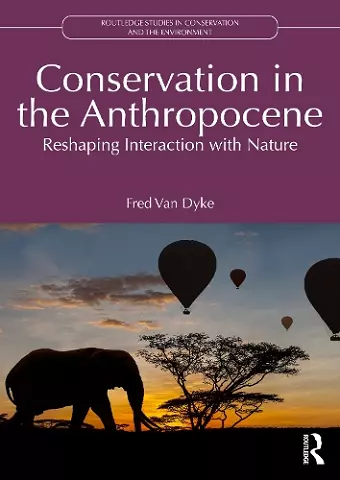Conservation in the Anthropocene
Reshaping Interaction with Nature
Format:Paperback
Publisher:Taylor & Francis Ltd
Published:6th Mar '25
Currently unavailable, and unfortunately no date known when it will be back
This paperback is available in another edition too:
- Hardback£145.00(9781032519159)

This book provides a critical assessment of conservation in the Anthropocene grounded in the personal, historical, and cultural development of human interaction with nature.
The author argues that conservation can no longer be primarily about preserving nature but must adapt its efforts to promote changes through which humans create a landscape that is neither abandoned nor degraded but used well by humans and non-humans alike. The book first reviews the origin of ideas and conditions that have led to the concept and classification of the Anthropocene and explores how the author’s own interactions with nature were shaped through his experience as a conservation biologist. Next, it considers how humans have come to be the primary drivers of ecological activity, geological events, and climate change. Chapters then focus on the need for new conservation thinking regarding novel ecosystems, urban conservation, the role of Indigenous Peoples in conservation, and the value of protected areas (PAs), parks, and wilderness. The book concludes by identifying strategies for effective conservation and argues for a new formulation of conservation values that redefine human relationships and interaction with nature. Chapters are enlivened by the personal experiences of the author and the first-person narratives of conservation activists and scientists throughout the world who are learning to practice and succeed in conservation efforts under Anthropogenic conditions.
Drawing on global examples, this book will be of great value to students and scholars of biodiversity conservation and environmental science ready to consider a new way of looking at the care and nurture of nature in the Anthropocene.
There is no better book in our time on the conservation of the natural world. Conservation in the Anthropocene describes and analyzes the history of conservation and identifies what changes must take place in the strategies, goals, and practices of conservation in order to succeed in the Anthropocene. A scientifically informed and well written guide to what we must do to care for our home planet. Dr. Steven Bouma-Prediger, Ph.D, Professor of Religion, Hope College, Michigan (USA), Author of Earthkeeping and Character
In a world where humanity's footprint is inescapable, Conservation in the Anthropocene: Reshaping Interaction with Nature gives a strong, invigorating viewpoint on how should we rethink our relationship with nature. It is a very well-timed investigation of issues and thought-provoking exploration of humanity's evolving relationship with the natural world. Dr. Fred Van Dyke skillfully weaves together science, ethics, and policy to present a compelling vision for conservation in the 21st century. This book not only challenges conventional approaches but offers a promising and sensible roadmap for future generations. Essential reading for anyone who cares about the fate of our planet and committed to reimagining our interaction with nature. –Bidhan Das, Ph.D., Rajshahi University and Vice Chancellor, North Bengal International University.
This eloquent book is a wise and urgent appeal to expand conservation efforts as we move into the Anthropocene. Integrating past and recent lessons learned with timeless Indigenous wisdom, Van Dyke ensures that readers will emerge better informed and more deeply inspired to live carefully and work skillfully to protect the beauty and diversity of life on earth. - David Warners, Professor of Biology and Director of Plaster Creek Stewards, Calvin University, Michigan (USA).
Van Dyke provides an accessible and holistic overview of the current and future scope of conservation biology. He blends scholarly study and a lifetime of leadership and teaching experience to challenge readers to reshape conservation values, practices, and outcomes in our human dominated world. Highly recommended for all who care about nature, especially those students just starting their journeys and who will lead us forward. - Brian Keas, Ph.D. Director for Undergraduate Research, Michigan State University, USA
I have long looked to Fred Van Dyke for wisdom on how to understand and engage the challenges before us, particularly when it comes to the role our species plays in driving global climate and environmental change. So I am very grateful for this book and enthusiastically recommend it to all who care about the good of this precious planet and the rich life we share it with. Ben Lowe, Ph. D.Executive Director, A Rocha USA
ISBN: 9781032511078
Dimensions: unknown
Weight: 530g
266 pages